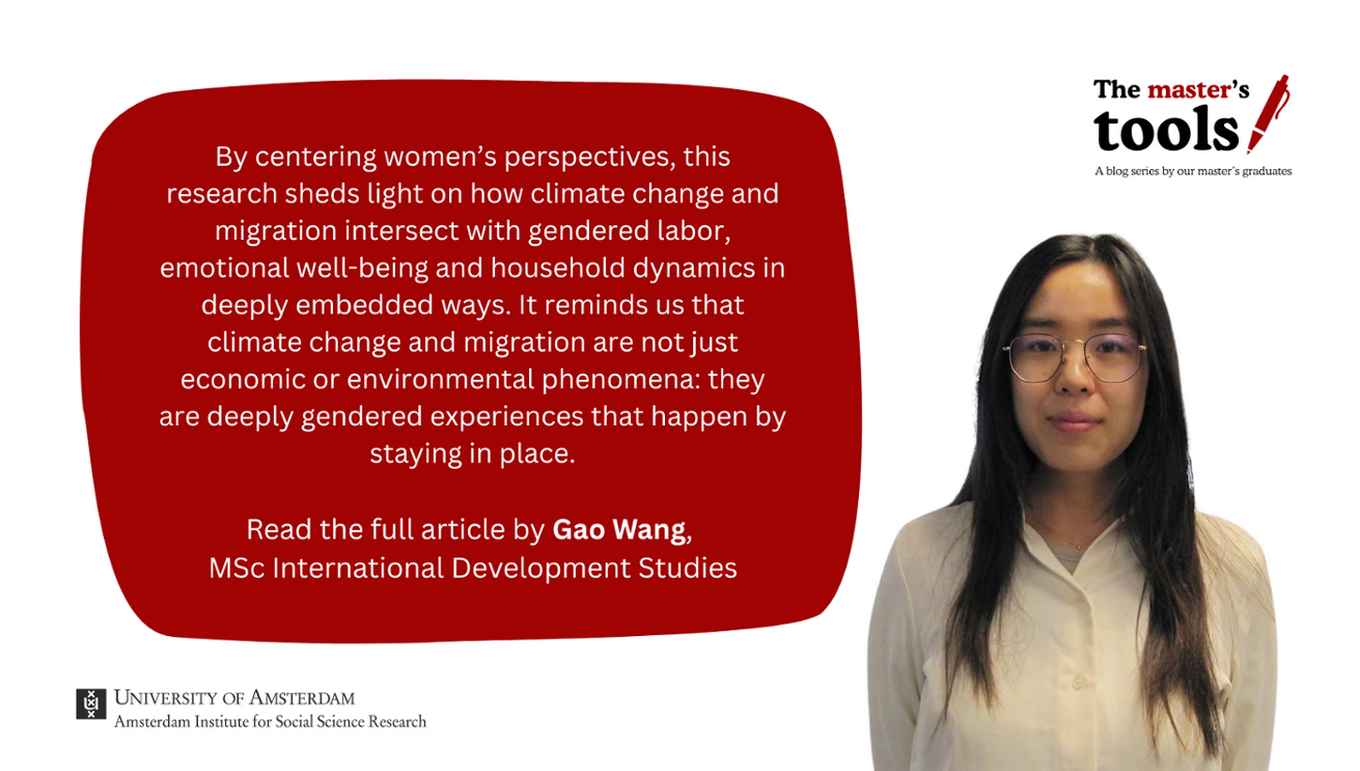Staying in Place: Climate-Induced Male Out-Migration and the Well-Being of Women Staying in Rural Uttar Pradesh, India
Blog by Gao Wang
4 November 2025
Driven by this, I decided to focus my master’s thesis research on the climate immobility of women in rural Uttar Pradesh, India. I specifically looked into how this condition influenced their well-being using an intersectional lens.
India is the most populated country in the world, home to over 1,46 billion people, and is particularly vulnerable to climate change. Among them, millions of people (47% of its population) depend on agriculture. In the last years, increasing droughts threaten their livelihoods, resulting in male-out migration to large cities, such as Mumbai. Sociocultural reasons explain why mostly men migrate. Women often stay in the village, and, in the absence of their husbands, their lived experiences change profoundly. With 766 surveys and 56 interviews, my research shows how the climate-induced migration of men influences women’s wellbeing. In my research, well-being is measured through the 3-dimensional well-being framework, developed by the Wellbeing in Developing Countries research group (McGregor & Sumner, 2010) and consists of: objective well-being (such as income and assets), subjective well-being (meanings people attach to the processes they engage in), and relational well-being (their relations with other people).

The three dimensional impacts on women
While all dimensions are undeniably intertwined, the findings are presented along the objective, subjective, and relational dimensions. They show how income, household responsibilities and spousal separation change women’s lived experiences. All names used in this post are pseudonyms.
“Money [is the most positive aspect about my husband’s migration], nobody thinks their husband should live outside the house, everyone thinks he should live here.”
Asha (45) dressed in a blue sari, shares with me the only positive aspect of her husband’s migration. She reflects the sentiment of many women; the increase of their household income, and thus objective well-being, is often the sole benefit that the migration brings. The women, therefore, trade a higher objective well-being for a lower subjective and relational well-being.
“What can I do? Yes, I feel overburdened, but I just mentally prepare myself to do it. I have to. There is no other choice.”
Nisha’s husband migrated 4 to 5 years ago to Mumbai. Since then, she bears all the responsibilities within the household, intensifying her burden of unpaid care labor and negatively influencing her subjective well-being. Women significantly take up more tasks related to, for example, managing finances. This difference is even starker when we look at women with migrant husbands in nuclear households; they perform 83.45% of the total household work, compared to 68.29% in extended households.
“[I make decisions about] ration, clothes for my children, medication. I don’t feel good, I then feel like he should be here (…). I don’t like anything about taking decisions, all the responsibilities. (…) From the beginning I didn’t make decisions, maybe if I did them from the start, I would have felt good.”
Women like Sarita also increasingly start to partake in (financial) decision-making processes. In fact, 30.4% of the women with migrant husbands report having high decision-making power, compared to 17.9% of women with no migrant husbands. While this would often be associated with empowerment and agency, the interviews show that this is rather imposed upon the women, questioning the Western association we approach these concepts with.
“I miss his emotional support. If he is here, I want him to stay, but because of our responsibilities towards our children, he has to go.”
Sonal shares how the physical separation between her and her husband becomes a significant and deeply felt aspect in her daily life, negatively influencing her relational well-being. While most women (91.6%) communicate daily with their husbands to manage their long-distance relationship, this does not substitute physical closeness, as many women (22.7%) always feel lonely with their husband apart from them.
What to s(t)ay on this?
These dimensions do not stand alone from each other; they are interrelated and intertwined. Women actively trade their subjective and relational well-being for an increased objective well-being. This shows they are not merely passive actors of the consequences of climate-induced male-out migration, but rather active agents who navigate, adapt to, and endure complex transformations in their lives.
Their experiences reveal the dual nature of migration: both as a necessary livelihood strategy and a source of social and emotional disruption. The women’s prioritization of household survival over personal comfort reflects not only resilience, but also the structural constraints they face shaped by intersecting factors such as household composition. By centering women’s perspectives, this research sheds light on how climate change and migration intersect with gendered labor, emotional well-being and household dynamics in deeply embedded ways. It reminds us that climate change and migration are not just economic or environmental phenomena: they are deeply gendered experiences that happen by staying in place.
To honor this resilience without neglecting the challenges, both international and national policy should not only take into account the experiences of those who are on the move, but also of those who are staying in place.